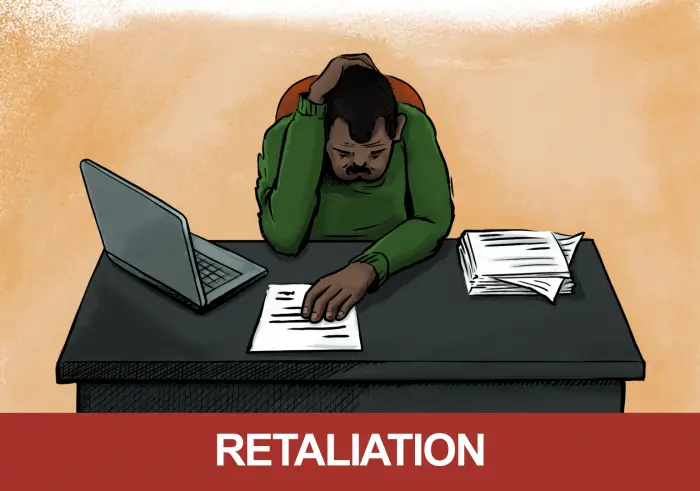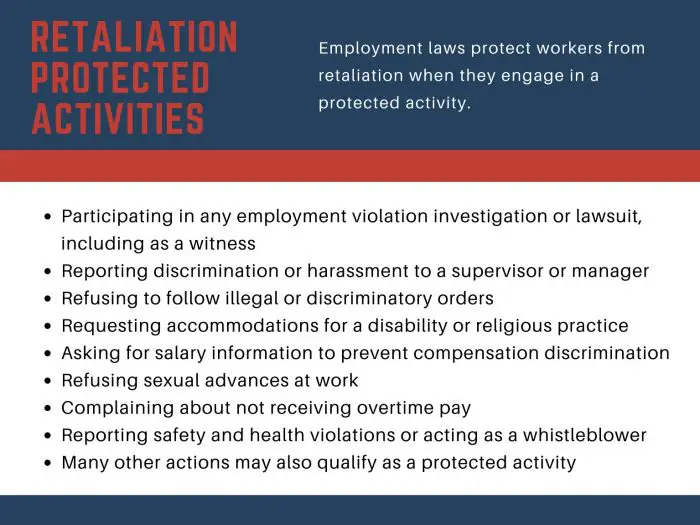Guide to Filing A Retaliation Lawsuit
March 23, 2025
By Charles Joseph, Employment Lawyer
Employment retaliation lawsuits recover millions for victims. But how do you file a retaliation lawsuit?
Retaliation is the most common type of workplace discrimination, according to the EEOC. And every year, victims of retaliation recover millions by filing retaliation lawsuits.

Why are retaliation lawsuits so common? In general, it’s easier to win a lawsuit for retaliation than other types of discrimination. That’s because it’s easier to prove retaliation. If you complain about a violation and your employer fires you, your employer must prove that it wasn’t retaliation. That’s a difficult burden to meet, especially if your performance was good.
But what is retaliation? Retaliation in the workplace means mistreating employees when they complain about discrimination, wage theft, certain fraudulent or dangerous practices, or other employment violations.
Emlpoyment retaliation lawsuit settlements pay millions of dollars every year. Take the EEOC’s enforcement of retaliation laws, for example. In 2021, the EEOC recovered $220 million in monetary benefits for victims of retaliation in the workplace. That’s up from just $41.8 million in 1997.
The EEOC’s $220 million in monetary benefits does not include retaliation lawsuit awards from courts brought by private attorneys. It also leaves out pre-trial private settlements, the most common resolution lawsuit settlements. The actual total from all workplace retaliation lawsuit settlements is much higher, possibly in the billions.
Have you experienced retaliation at work? Are you considering suing your employer for retaliation? Our guide walks through the legal definition of retaliation, how to prove retaliation, and how to file a retaliation lawsuit.
What is Retaliation in the Workplace?
Employees regularly face retaliation in the workplace. An employee might request family medical leave and their employer retaliates by giving them a worse schedule or taking away top clients. Retaliation can also mean firing someone for complaining about discrimination, sexual harassment, or wage theft.
Keep in mind that retaliation must meet certain legal standards. Under the law, retaliation takes place if employers treat an employee unfavorably because of an employee’s protected activities. What, exactly, does that mean? Employers can’t punish people for exercising their rights.
For example, filing a discrimination complaint counts as a protected activity. So does going to HR about sexual harassment, acting as a witness in an employment lawsuit, or, depending on the state, reporting illegal activity to a supervisor.
When employees engage in these protected activities, retaliation lawsuits protect their rights. Employees who experience retaliation can file a lawsuit – and a retaliation lawyer can help.
Check out our FAQ on What is Retaliation to learn more
Workplace Retaliation Examples
What are some examples of retaliation? Retaliation in the workplace can take many forms. That’s because retaliation comes after an earlier employment violation.
Take a sexual harassment example. An employee turns down their boss’s sexual advances. In retaliation, their boss fires them. This is a clear-cut example of retaliation that also includes a sexual harassment violation.
Similarly, an employee might complain to their supervisor about unpaid overtime. In retaliation, the supervisor takes away the employee’s shifts. This qualifies as wage theft and retaliation.
Other workplace retaliation examples include mistreatment for:
- Acting as a whistleblower
- Participating in an EEOC investigation
- Requesting a reasonable accommodation for a disability or religious practice
- Refusing to follow illegal orders
When employees experience retaliation, they have legal protections.
How to Prove Retaliation in the Workplace
Victims of retaliation must prove that they faced unfair treatment at work because of a protected activity. But how can you prove retaliation?
Proving a retaliation lawsuit starts with strong evidence.
You can strengthen your case by documenting the mistreatment. As a first step, keep records of all protected activities. Make complaints about discrimination, harassment, or wage theft in writing. Take notes and ask coworkers to write statements about what happened. Be sure you can prove your written complaint was received. In addition to HR, you can copy your supervisor and senior management, including the General Counsel and the CEO.
After documenting a protected activity, employees should also keep any evidence related to the retaliation. Keep written statements of any disciplinary action, performance improvement plans, or negative evaluations. If your company fires you, ask for the reason in writing.
Strong evidence makes it easier to prove retaliation. And the law protects employees from retaliation even if they cannot provide the underlying employment violation.
For example, consider an employee who complained about gender discrimination and faced a wrongful termination because of it. Even if a court later finds that there was no discrimination, the employee can still win a retaliation lawsuit.
However, employees must have a good faith, reasonable belief that discrimination, harassment, wage theft, or another employment violation took place. Employees cannot file baseless HR complaints and then claim retaliation.
Also, you must complain about a violation – complaining about generic mistreatment is not a protected activity, so it does not meet the legal definition for retaliation protections.
Some states have additional retaliation protections. In New Jersey and some other states, complaining about unethical activity qualifies. In New York, complaining about any violation of a statute or rule is enough to trigger protections.
How to File Employment Retaliation Lawsuits
Victims of retaliation have several options when it comes to a retaliation lawsuit. Many start by filing an EEOC complaint. The EEOC investigates retaliation claims and either negotiates a retaliation settlement or files a retaliation lawsuit on the employee’s behalf. Employees can also receive a notice of the right to sue and file their own retaliation lawsuit.
The EEOC requires your employer to specifically respond to the details of your filing. That gives your legal team more insight into their reasoning and an advantage in future litigation or negotiation.
Navigating the retaliation lawsuit process can feel overwhelming. An employment lawyer can help. Employees who suspect retaliation can contact an employment lawyer for a consultation to find out if they have a case. An employment lawyer can also help file an EEOC complaint or file a retaliation lawsuit.
Does it make sense to hire a lawyer? Many employment lawyers work on pure contingency, meaning they get paid out of the retaliation lawsuit award. That means victims of retaliation only pay the lawyer if they win their case and owe nothing at all if they don’t win.
Employment lawyers can also help you negotiate a fair retaliation lawsuit settlement.
What To Consider Before Suing for Retaliation
A strong retaliation lawsuit requires strong evidence. In many cases, retaliation lawsuit awards directly correlate with the strength of the evidence.
For example, if the retaliation causes emotional pain and suffering, victims can receive emotional distress damages. Workplace retaliation lawsuit settlements can also include back pay and front pay. And evidence can go beyond proof of an employment violation and retaliation. Coworkers can testify on your behalf. A doctor or mental health professional can testify about emotional distress.
Before pursuing a retaliation lawsuit, consider reaching out to an employment lawyer. Experienced employment lawyers can evaluate your case and help you prove retaliation. Most employment cases settle out of court, so an employment lawyer can make sure you receive a fair retaliation lawsuit settlement.
Charles Joseph has over two decades of experience in employment law. He is the founding partner of Joseph and Kirschenbaum, a firm that has recovered over $200 million for clients, and the creator of Working Now and Then.
Contact Charles Joseph to find out if you have a retaliation lawsuit.
